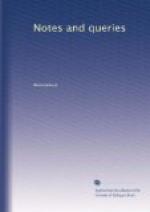That the uniform meaning of flaws in the poet’s time was sudden gust of wind, and figuratively sudden gusts of passion, or fitful and impetuous action, is evident from the following passages:—
“Like a red morn, that ever yet
betoken’d
Wreck to the seamen, tempest to the field,
Sorrow to shepherds, woe unto the birds,
Gust and foul flaws to herdsmen
and to herds.”
Venus and Adonis.
“Like a great sea-mark standing
every flaw.”
Coriolanus, act v.
sc. iii.
“—patch a wall to expel
the winter’s flaw.”
Hamlet, act v. sc.
i.
“Like to the glorious sun’s
transparent beams
Do calm the fury of this mad-bred flaw.”
3d Pt. Henry VI.,
act iii. sc. i.
“—these flaws
and starts (impostors to true
fear).”
Macbeth, act iv. sc.
iv.
“Falling in the flaws of
her own youth, hath
blistered her report.”
Meas. for Meas., act
ii. sc. iii.
So far for the poet’s acceptation of its meaning.
Thus also Lord Surrey:—
“And toss’d with storms, with flaws, with wind, with weather.”
And Beaumont and Fletcher, in The Pilgrim:—
“What flaws, and whirles
of weather,
Or rather storms, have been aloft these
three days.”
Shakspeare followed the popular meteorology of his time, as will appear from the following passage from a little ephemeris then very frequently reprinted:—
“De Repentinis Ventis.
“8. Typhon, Plinio, Vortex, aliis Turbo, et vibratus Ecnephias, de nube gelida (ut dictum est) abruptum aliquid saepe numero secum voluit, ruinamque suam illo pondere aggravat: quem repentinum flatum a nube prope terram et mare depulsum, definuerunt quidam, ubi in gyros rotatur, et proxima (ut monuimus) verrit, suaque vi sursum raptat.”—MIZALDUS, Ephemeridis AEris Perpetuus: seu Rustica tempestatum Astrologia, 12º Lutet. 1584.
I have sometimes thought that Shakspeare may have written:—
“As flaws cong_est_ed in the spring of day.”
It is an easy thing to have printed cong_eal_ed for that word, and congest occurs in A Lover’s Complaint. Still I think change unnecessary.
Has the assertion made in An Answer to Mr. Pope’s Preface to Shakspeare, by a Strolling Player, 1729, respecting the destruction of the poet’s MSS. papers, been ever verified? If that account is authentic, it will explain the singular dearth of all autograph remains of one who must have written so much. As the pamphlet is not common, I transcribe the essential passage:—




